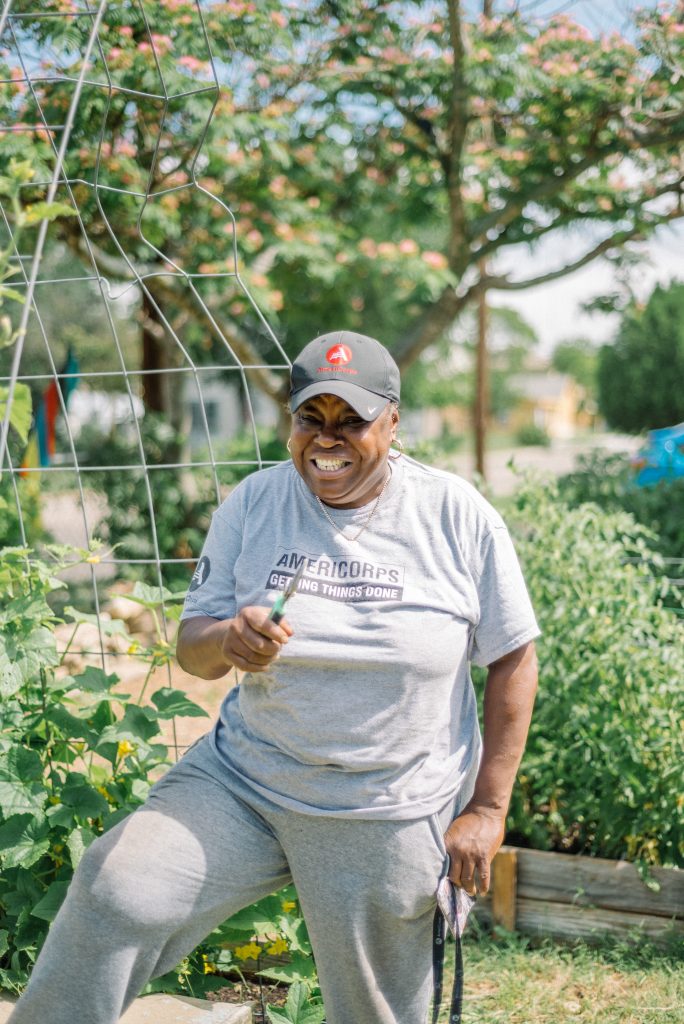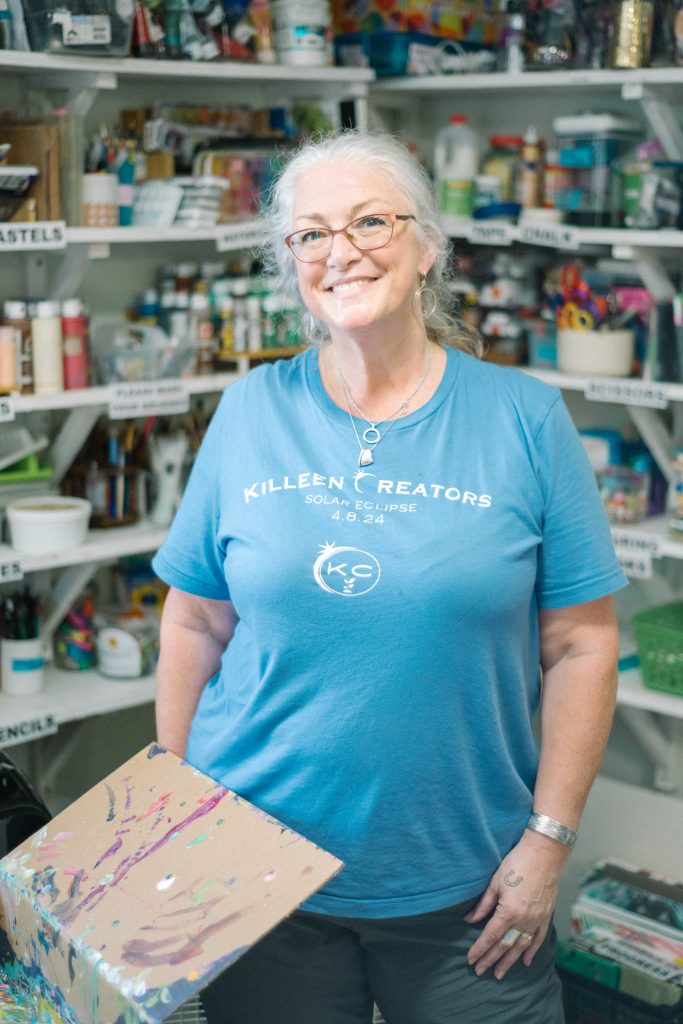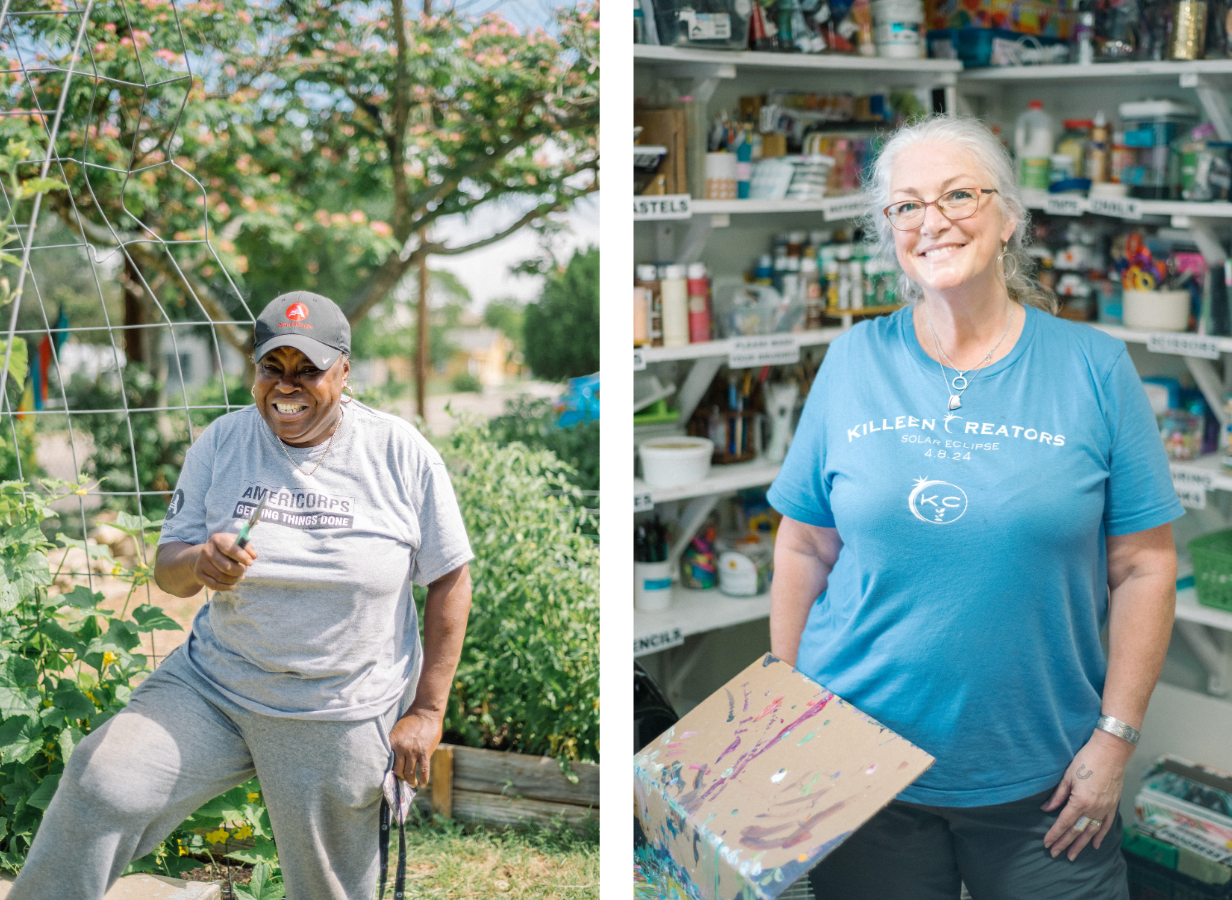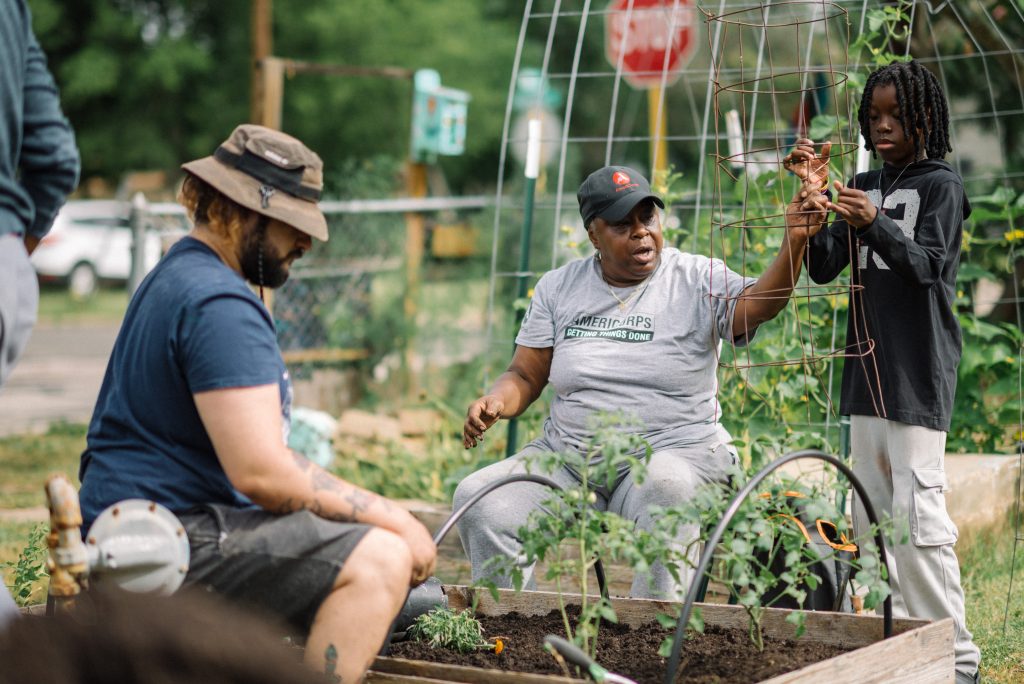A massive heart-shaped sculpture sits at the center of the community garden outside the Killeen Creators studio, with a joyful message adorning its vibrantly painted facade: Community, Healing, Growth, Hope. Around it, tomato plants climb sturdy stakes, kale grows in neat rows, and the morning sun filters through colorful wildflowers. It’s a lush green oasis amid the cracked concrete and strip malls of this corner of Killeen—and it’s where Jacqueline Hewitt (affectionately known as Miss Jackie) faces her hardest challenge every single day.
“I did a lot of negative stuff… back in the day. If anybody knows my story, this area right here from the Taco Bell up there on 10th Street all down the street—I used to do a lot of stuff,” says Miss Jackie, whose confident bearing and assured voice belie the vulnerability of her confession. This neighborhood holds her darkest memories—the blocks where she once worked the streets, struggling with pharmaceutical addictions and “was eating the dirt to try to find nutrition.”
Now she tends the soil here as an AmeriCorps member with Killeen Creators, planting seeds instead of destroying dreams. The irony isn’t lost on her—finding redemption in the earth she once consumed in desperation. “I do it because I want people here in the community to see that if Miss Jackie picked herself up out of the dirt, y’all can do it too,” she explains. “And I think that’s why I like working with dirt. If I can pull myself up out of that dirt, y’all can too… I’m [serving] right here in the area where all my mess took place. It’s a challenge each and every day, but it’s a rewarding challenge.”
Miss Jackie’s story is both deeply personal and universally resonant—a testament to the human capacity for transformation when given the right support and opportunity. The same streets that witnessed her lowest moments now watch her walking with dignity, greeting neighbors by name, carrying herself with the quiet authority of someone who has earned every ounce of respect she receives.
Building the Nervous System of Change
"AmeriCorps have become like the root system for a tree or the veins in your body. They're conduits. They carry messages, information, and tasks that need to get done throughout the city and the county... Our community is an organism, and we have utilized AmeriCorps in ways to fill needs and niches that don't really get met."
Kristin Wright, Executive Director
Miss Jackie’s transformation from addiction to respected community leader illustrates something profound happening in Killeen—a city of nearly 160,000 next to Fort Hood where military families come and go, leaving behind a complex web of need. In a region that, according to Built For Texas research, has the fewest nonprofits of any area in the state, organizations like Killeen Creators depend on AmeriCorps to provide what Executive Director Kristin Wright calls the “nervous system” that connects a fragmented community.
Kristin has watched this fragmentation firsthand. Military families arrive with hope and leave with orders, but not everyone can follow. Some are left behind by divorce, by disability, by the simple economics of relocation. Others choose to stay, putting down roots in a place that was supposed to be temporary. The result is a community of people who need connection but lack the traditional support structures that develop over generations in more stable towns.
When Killeen Creators began in North Killeen—where there were no major grocery stores and little public transportation—the founders discovered that good intentions weren’t enough to address the widespread homelessness and food insecurity. “Gardening is an every day commitment, especially in Texas, and not all the volunteers who signed up really knew that as fully as we found out,” Kristin recalls. The Texas heat doesn’t pause for busy schedules or competing priorities. “So AmeriCorps was an essential godsend to have people who have made a commitment, and they show up daily, so we’re able to water our gardens and plant seeds that actually thrive and turn into vegetables that feed people.” Kristin continues. That reliability became the foundation everything else could build upon.
That daily commitment creates more than vegetables. It creates relationships, trust, and hope in a community where many residents struggle with military transitions, food insecurity, mental health challenges, and addiction. Kristin describes AmeriCorps members as “conduits” who “carry messages, information, tasks that need to get done throughout the city and the county.” They’ve become the root system that allows community partnerships to flourish.



The Power of Lived Experience
The ten AmeriCorps members at Killeen Creators work both in the organization’s four community gardens and in their small studio on 10th Street, where a mural declares it a “Safe Space” with rules like “No judgment,” “Mistakes welcome,” and “Be kind (to yourself & others).” The studio serves as both classroom and sanctuary, a place where people can try new things without fear of failure or ridicule.
Many AmeriCorps members bring their own experiences of hardship—homelessness, post-traumatic stress, addiction, even incarceration. This isn’t coincidental—it’s intentional. Kristin and her co-founders recognized early that the most effective peer support comes from people who have walked similar paths.
“Having [AmeriCorps members] with very different lived experience, people in the community who have really intense needs and often low trust find someone on our team they connect with,” Kristin explains. “They’re the best peer support and coaches, natural coaches in our community for people who really do need that help.” There’s something powerful about hearing ‘I’ve been there’ from someone whose scars tell the same story as your own.
This approach challenges traditional nonprofit models that often create clear distinctions between service providers and service recipients. At Killeen Creators, those lines blur intentionally. The individual teaching a gardening class in the morning might be attending a peer support group in the afternoon. The AmeriCorps member helping someone find housing might have been homeless themselves just months earlier.
Miss Jackie’s story exemplifies this power of lived experience. Her journey to AmeriCorps began when she started volunteering at the gardens, finding peace in the morning ritual of watering plants. The simple act of nurturing growth became a form of meditation, a way to quiet the chaos in her mind and focus on something life-giving.
Kristin noticed her pain during one of their early conversations, and Miss Jackie shared pieces of her story—the addiction, struggle, and shame experienced on these very blocks. “It was really in that exchange with her that James, a co-founder and director, and I said, ‘We’ve gotta find a way to take these people who want to move forward and help give them an opportunity to do that,'” Kristin remembers.
Miss Jackie became their first AmeriCorps member and has since earned her certification as a professional peer support counselor. “It’s the first paid employment that’s legal that she’s ever had in her life,” Kristin notes. The significance of this cannot be overstated—not just the living allowance and education award, but also the dignity of legitimate work and the respect that comes with professional credentials.

Creating Space For Vulnerability
"You’ve got to face your fears. I was always a runner from the age 13 until I became a member of AmeriCorps — I always ran from stuff I didn’t want to face or deal with... But now on the daily, you’ve got to get up, you’ve got to suit up, and you’ve got to take care of your business... I think that's why I like working with dirt. If I could pull myself up out that dirt, y'all can too."
Jacqueline Hewitt, AmeriCorps member
Miss Jackie’s influence ripples through the community in ways both seen and unseen. She has an “uncanny ability to connect with people,” Kristin observes, whether they’re teenagers caught in the juvenile justice system or elderly residents in wheelchairs who need help reaching tomatoes on the vine. Her approach is direct but never harsh, honest but never judgmental.
The power of her presence becomes most apparent in moments of crisis. “We had a lady come a couple weeks ago who as part of her journal share disclosed—and very distraught and nervous to be telling this group of people—that she had gone back to prostituting to help pay for food,” Kristin recounts. The room fell silent, heavy with shame and fear of judgment.
“And it’s just a very different thing to have somebody in the room who can say, ‘I feel that. I know that. I’ve done that, and I don’t judge you,'” Kristin continues. Miss Jackie’s response wasn’t a lecture or advice or even comfort in the traditional sense. It was recognition—one human acknowledging another’s pain without trying to fix it or explain it away.
This non-judgmental approach transforms lives in unexpected ways. Jeffrey Nagel, a chef struggling with severe anxiety that manifested in compulsive skin picking, found his way to Killeen Creators through his friendship with Miss Jackie. Initially resistant to art classes—”I’m like, ‘Oh god, I don’t do art,'” he recalls—Jeffrey needed someone who wouldn’t take no for an answer but also wouldn’t push too hard.
Miss Jackie’s invitation was persistent but patient: “He’s a very friendly, outgoing person, but he wasn’t social like that. I used to tell him, ‘You got to just come down to the Killeen Creators and just hang out for a little while and just see what we do,’” recall Miss Jackie.
At Killeen Creators, what Jeffrey found is a place where he is safe to explore, take risks, and play. He discovered the art of paint pouring as an antidote to his high-pressure work environment where “everything has to be in control.” The art form became therapeutic precisely because “you have limited control because as you put the paint down… you have no control over how it looks until the end.” This lesson in letting go has helped calm his anxiety and given him new purpose as a monthly instructor, sharing techniques he’s learned with others seeking their own creative outlets.
“Teaching gives me a satisfaction that I never really had before,” Jeffrey reflects. He’s even brought paint pouring classes to the retirement facility where he works, watching elderly residents light up as they create. The joy is infectious and mutual—both teacher and student discovering something new about themselves through art.

From Homelessness to Hope
The ripple effects extend to those who seemed furthest from hope. Derrek McIlwain, a reserved man with a distinctive mullet, was literally living on Killeen Creators property when Kristin and co-founder James first encountered him. After losing his job due to injury and illness, spending time in mental health facilities, and nearly three years of homelessness, he had found his way to their gardens—not as a participant in programming, but as someone seeking shelter.
“In between 5 a.m. and 3 p.m., I was here,” Derrek says with a chuckle. He had learned the rhythms of the property, when staff arrived and when they left, how to make himself invisible during business hours. The gardens offered something he couldn’t find elsewhere: a sense of peace, of purpose, of being surrounded by growing things instead of decay.
“When they first noticed I was on the property, they were like, ‘Hey, why don’t you come in and cool off? See if you feel like a class or something?'” That simple invitation—free of demands or conditions—began a slow process of connection. Trust built gradually, one conversation at a time, one small act of inclusion after another.
When an AmeriCorps position opened up, they encouraged him to apply. The transition from homeless resident to AmeriCorps member wasn’t immediate or easy, but it was possible because the foundation of relationship had already been laid.
“I’ve been off the street for about a year and a half now in my own place. It’s all thanks to AmeriCorps,” Derrek reports. The work has shown him “that I can do more than I thought I could, and some of the issues I have aren’t as hard to deal with in a job that is made for your issues.” The phrase “made for your issues” captures something essential about the AmeriCorps model—not asking people to hide their struggles, but finding ways to make those struggles part of their strength.
"I’ve been off the street for about a year and a half now in my own place. It’s all thanks to AmeriCorps. It made me figure out that I can do more than I thought...in a job that is made for your issues. AmeriCorps means I can stay off the street and have a roof over my head and feel like I'm contributing. Killeen Creators is friends, family, coworkers, community, and just having a place to be myself and to be able to work."
Derrek McIlwain, AmeriCorps member

Filling the Gaps that Matter
For Kristin, these individual transformations represent something larger—AmeriCorps filling gaps that neither private sector nor traditional nonprofits can address: “You don’t make money feeding poor people. You don’t make money addressing homelessness. So it has to get done another way through partnership between for-profit, private, government, and AmeriCorps has really been that nervous system or vein system that connects us.”
This connective function is especially crucial in Killeen, where military turnover creates what Kristin calls “unmet needs.” The constant rotation of personnel means fewer sustained nonprofits and weaker social infrastructure. People arrive needing services that don’t exist, or exist but can’t be sustained by volunteer labor alone. AmeriCorps members bridge these gaps, linking Killeen Creators with roughly 20 other organizations and government entities to share resources and coordinate services.
The military context adds layers of complexity to every issue. Veterans return with PTSD and find limited mental health resources. Military spouses struggle with employment gaps caused by frequent moves. Children change schools repeatedly, disrupting their education and social development. Elderly parents of service members find themselves isolated when their children deploy or relocate.
Miss Jackie understands this broader impact from lived experience. “Since I’ve been working for AmeriCorps, I have seen it take people from nothing. I’ve seen it change homeless people. I’ve seen it change addicts. I’ve seen it change elderly people. I’ve seen it change people with PTSD,” she reflects. The transformation happens because AmeriCorps creates what Killeen lacked: “a building for all these different nationalities of people to come in there, and they interact like they’ve known each other for life.”

Tending Both Soil & Souls
The military connection makes this work especially poignant. “Fort [Hood] being the biggest Army post in the United States,” Miss Jackie notes, means there are “parents that you’ve left here, there’s grandparents that you’ve left here, there’s wives, there’s children, there’s mentally disturbed, there’s all that stuff that you’ve left here in Killeen, but no help programs for them.”
The phrase “you’ve left here” carries weight—an accusation and an observation wrapped together. Military families don’t choose where they go or when they leave, but the impact on communities like Killeen is real and lasting. AmeriCorps fills that void not through programs alone but through the daily presence of people who show up, water the gardens, staff the classes, and ask how you’re doing.
Kristin calls it “the daily work that gardens require”—but she could be describing community building itself. Both require consistency, patience, and faith that small daily acts will eventually yield something life-sustaining. You can’t plant seeds sporadically and expect a harvest. You can’t build trust with sporadic attention and expect lasting relationships.
“The food means nothing if it doesn’t get to people,” Kristin observes. The same is true for hope, healing, and second chances. They mean nothing if they don’t reach the people who need them most—the veterans struggling with reentry, the elderly residents in food deserts, the young people caught in cycles of trauma, the community members society has written off.
Miss Jackie, who has become a fixture in the neighborhood, embodies this daily commitment. “I’ve got my respect back, not just only from the community or from people in a higher position than me. I’m very respected here in the neighborhood,” she says with quiet pride.
Standing in the garden outside the Killeen Creators studio where her past and present intersect daily, Miss Jackie embodies the metaphor that drives her work: “I can plant the seed. I can water it. But it’s the love that makes it grow. I can’t do that all by myself.”
AmeriCorps provides that love—not as sentiment, but as the patient, daily commitment to show up for people and communities that others might overlook. In Killeen, AmeriCorps members have become the root system that allows an entire community garden to flourish, proving that sometimes the most powerful transformation happens not through grand gestures but through the simple act of planting seeds and tending them with care.
“AmeriCorps really provides a unique opportunity for people who have some work challenges, but also work ability, to figure that out and become as productive a member of society as they can,” Wright reflects.
In a nation that often sees only binary categories—success or failure, housed or homeless, employed or unemployed—AmeriCorps creates space for the much larger group of people who exist somewhere in between. They nurture what Wright calls “everyone has something to offer,” creating conditions where both individuals and communities can discover what that something might be.
The heart-shaped sculpture in the garden captures it perfectly: Community, Healing, Growth, Hope. These aren’t just words carved in metal—they’re the daily reality of what happens when AmeriCorps members show up, day after day, to tend both soil and souls. In Killeen, they’ve grown more than vegetables. They’ve cultivated the kind of community that transforms lives and proves that everyone, indeed, has something precious to offer.

Interviews, photography, editing & prompting by Joshua Winata
Text generated with ChatGPT and Claude

